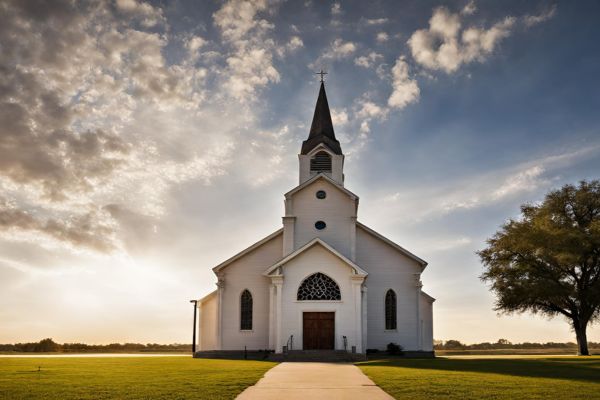Religious organizations serve as pillars of support, spirituality, and community for countless individuals. These places of worship hold not only deep sentimental value but also significant assets and responsibilities.
Ensuring the protection of these assets and mitigating potential risks is paramount.
In this comprehensive guide, we will explore the world of property insurance for churches- coverage, cost, pros, and cons that religious organizations should consider.
Why Do Religious Organizations Need Insurance?
Religious organizations, like any other institutions, need insurance for several important reasons:
- Property Protection: Many religious organizations own or lease property, including places of worship, community centers, and offices. Insurance provides protection against risks such as fire, vandalism, natural disasters, or theft. This coverage helps ensure that the organization can repair or replace damaged property without incurring a substantial financial burden.
- Liability Coverage: Religious institutions host gatherings, events, and activities that involve congregants and the community. Liability insurance protects the organization in case someone is injured or their property is damaged while on the premises or during a church-sponsored event. This can include slip-and-fall accidents, accidents during church activities, or other unforeseen incidents.
- Employee Protection: If a religious organization has employees, it is often legally required to provide workers’ compensation insurance. This coverage ensures that employees receive medical care and compensation for work-related injuries or illnesses, reducing the organization’s liability.
Essential Insurance Types for Religious Organizations
Religious organizations, like any other business entity, face a range of potential risks. These risks can include property damage, accidents, liability claims, and more.
To safeguard their assets and ensure the continuity of their mission, churches require various types of insurance coverage.
The Significance of Property Insurance for Churches
Property insurance is a cornerstone of risk management for religious organizations. It provides protection against damages that can occur to church buildings and their contents. This coverage extends to a wide array of perils, including natural disasters, accidents, and vandalism.
Coverage for Damages Such as Natural Disasters and Accidents on Church Premises
Churches are not immune to disasters or accidents. Fires, floods, storms, and other unforeseen events can strike at any time.
Property insurance for churches provides financial support to rebuild or repair damaged structures and replace valuable assets. It also covers incidents involving injuries or accidents that may occur on church premises.
Types of Insurance for Religious Organizations
Religious organizations have unique insurance needs. Here are some of the key types of insurance coverage commonly sought by churches:
General Liability
General liability insurance offers protection against common business risks. It covers bodily injury, property damage, personal injury, and advertising injury claims. In the context of churches, this coverage can be essential to address incidents involving visitors or members who may be injured while on church property.
Business Owner’s Policy (BOP)
A Business Owner’s Policy (BOP) is a comprehensive insurance package that combines general liability and property insurance. It offers a cost-effective solution for churches, providing coverage for both liability risks and property protection.
Commercial Auto
Church-owned vehicles, such as vans or buses used for transportation of members or students, need insurance coverage. Commercial auto insurance ensures that these vehicles are protected in the event of accidents or damage.
Workers’ Compensation
Religious organizations often employ staff and volunteers. Workers’ compensation insurance is crucial for providing benefits to employees or volunteers who become ill or injured while performing their duties for the church.
Coverage Details
Property insurance for churches encompasses a wide range of coverage details that are essential to understand:
Property Protection
Property protection coverage includes compensation for damages resulting from various perils, such as natural disasters, fires, vandalism, theft, and more. It extends to both the church building and its contents, including valuable religious artifacts.
Auto Liability and Physical Damages
For churches with vehicles, auto liability and physical damages coverage is essential. It ensures that any accidents involving church-owned vehicles are financially covered, including property damage and bodily injury claims.
Volunteers and Childcare
Churches often rely on volunteers to assist with various activities and programs. Proper screening of volunteers and ensuring the safety of children in childcare programs are crucial aspects of church insurance to prevent potential liability claims.
Employee Protection
Employee protection coverage addresses risks related to employee actions, such as dishonesty, theft, and fraud. Additionally, it provides protection against employment practices claims, including allegations of wrongful termination or discrimination.
Injuries
Coverage for personal injuries occurring on church property is vital. This can include slip-and-fall incidents, medical emergencies, or accidents during church events. Ensuring that injured parties receive proper medical care is a priority.
Factors Influencing Insurance Costs
Several factors can influence the cost of insurance for religious organizations. It’s important to consider these factors when assessing insurance needs:
Size and Location of the Building
The size and location of the church building play a significant role in determining insurance costs. Churches in areas prone to natural disasters may face higher premiums.
Value of Equipment and Other Assets
The value of equipment, religious artifacts, and other assets housed within the church can impact insurance costs. Accurate valuations are essential to ensure adequate coverage.
Number of Employees and Volunteers
The number of employees and volunteers associated with the church can affect insurance expenses, particularly workers’ compensation coverage.
Frequency of Church Activities and Events
Churches that host frequent activities, events, or programs may have higher insurance costs due to increased liability exposure.
Insurance Claims History
A church’s history of insurance claims can also influence premiums. A record of frequent claims may result in higher insurance costs.
Pros of Having Church Insurance
Financial Stability in the Face of Unanticipated Disasters or Lawsuits
Church insurance provides financial stability, ensuring that the organization can recover and rebuild in the aftermath of unforeseen disasters or legal challenges.
Protection Against Legal Costs and Medical Bills
Insurance coverage includes protection against legal expenses and medical bills that can arise from liability claims or accidents on church premises.
Peace of Mind for Church Leaders and Members
Knowing that the church’s assets and mission are protected brings peace of mind to both church leaders and members. It allows them to focus on their spiritual mission without the constant worry of financial risks.
Ability to Resume Operations Swiftly After Adverse Events
In the event of property damage or other setbacks, insurance allows churches to resume their operations swiftly. It helps maintain continuity and ensures that congregations can return to their spiritual home as soon as possible.
Cons of Having Church Insurance
Potential for Higher Premiums Compared to Other Building Types
Churches may face higher insurance premiums compared to other building types due to their unique risks and coverage needs.
The Complexity of Determining Adequate Coverage
Determining the right amount of coverage can be complex, and churches may risk underinsuring or overinsuring their properties and assets.
The Need for Regular Reviews and Updates to Insurance Policies
Church insurance needs can evolve over time, necessitating regular reviews and updates to insurance policies. This can be administratively burdensome.
Conclusion
In conclusion, property insurance for churches is not just a financial necessity; it’s a safeguard for the spiritual sanctuaries that provide solace and support to communities.
It ensures that religious organizations can continue their vital work even in the face of adversity.
Customizing insurance policies to meet the unique needs of each church is paramount. By doing so, churches can protect their assets, their members, and their mission while continuing to serve as beacons of hope and faith in their communities.
FAQs (Frequently Asked Questions)
1. What is the significance of a Business Owner’s Policy (BOP) for churches?
A Business Owner’s Policy (BOP) is a comprehensive insurance package that combines general liability and property insurance. It is significant for churches as it offers a cost-effective solution that provides coverage for both liability risks and property protection.
2. How can churches ensure they have adequate insurance coverage?
To ensure adequate insurance coverage, churches should conduct regular assessments of their assets and property values. It’s advisable to work closely with insurance professionals who specialize in church insurance to determine the appropriate coverage levels.
3. What steps can churches take to mitigate insurance costs?
To mitigate insurance costs, churches can implement risk management strategies, improve safety measures, and explore options for bundling insurance coverage. Additionally, maintaining a claims-free history can lead to more favorable premium rates over time.





